What Can Hamsters Drink And Can’t Drink: A Comprehensive Guide
Hamsters need fresh and clean water at all times. But that’s not the only thing they can drink. When feeding these little ones, you want to make sure you know what they can and cannot drink. You should not give them anything.
So, what can hamsters drink and can’t drink? Hamsters can drink plain or filtered water, skim or oat milk, and small amounts of low-sugar juice. They should not drink alcohol, high-sugar drinks, or caffeinated beverages, as these can be toxic.
Hydration is important for hamsters, but you have to do it right. Read on to learn why the little furry animals can’t have just any kind of liquid and how to keep them hydrated.
What Hamsters Can and Cannot Drink?
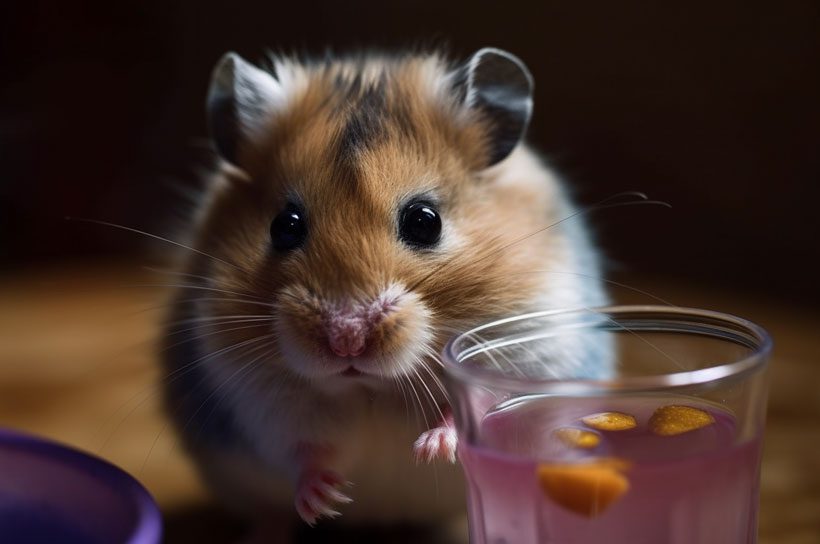
Here is a breakdown of what hamsters can and cannot drink.
| What Hamsters Can Drink | What Hamsters Cannot Drink |
|---|---|
| Water | Alcohol |
| Milk | Sugary Drinks |
| Low-Sugar Juices | Caffeinated Beverages |
What Can Hamsters Drink And Can’t Drink?
Keeping hamsters hydrated is a part of their overall health. It helps to ensure that their organs remain healthy and functioning properly. So let’s have a look at what they can and cannot drink in the following section.
What Hamsters Can Drink
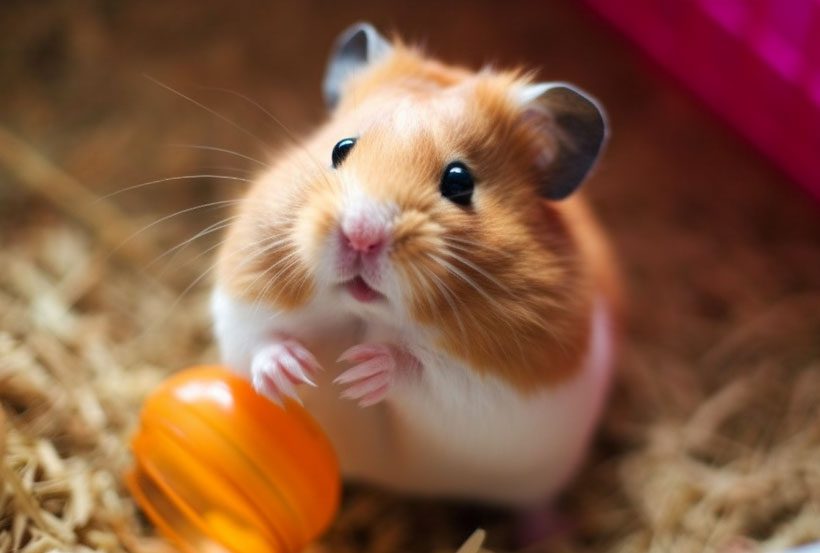
Hamsters need a balanced diet to stay healthy and here’s a list of what hamsters can drink:
Water
Hamsters need constant access to water and should drink between 10 to 30 milliliters daily. Water can be provided in a dish or a water bottle, and it’s best to use filtered or bottled water if possible. Tap water is also okay if it’s drinkable and not contaminated or polluted.
It’s essential to keep an eye on your hamster’s drinking habits, as some may prefer to drink less than others. If your hamster isn’t drinking enough, you may need to take them to the vet for further examination.
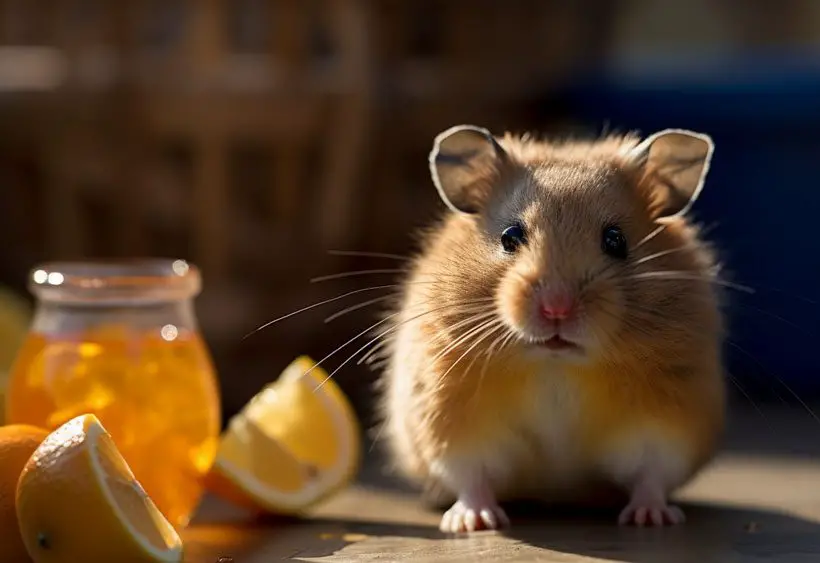
Milk
Hamster mothers produce milk for their young, so it’s safe for them to drink in moderation. If you decide to give your hamster milk, ensure it is skim or oat milk, as these are the healthiest options.
You should only give them small amounts at a time and monitor them for any adverse reactions. Chocolate milk and other dairy products should be avoided altogether.
Low-Sugar Juices
You can give your hamster a little fruit juice as a treat, but make sure it is 100% juice with no added sugars. Some of the best low-sugar juices for hamsters include apple, peach, blueberry, pear, and cranberry juices.
While giving them the fruits themselves is considered the healthier option, juicing these low-sugar fruits can be a fun way to give them a treat.
Here is a video of a Hamster drinking water
What Hamsters Cannot Drink
Hamsters cannot drink alcohol, sugary drinks, or caffeinated beverages. They should only drink water and their mother’s milk when they are born.
Alcohol
It’s generally not a good idea for hamsters to drink alcohol since it can be toxic. Alcohol has a different metabolism in small animals like hamsters and can quickly cause serious health problems.
Additionally, alcohol has a much more powerful effect on their tiny bodies than on humans, making it even more dangerous. It’s best for the health and safety of your pet hamster to keep all alcoholic beverages far from them.
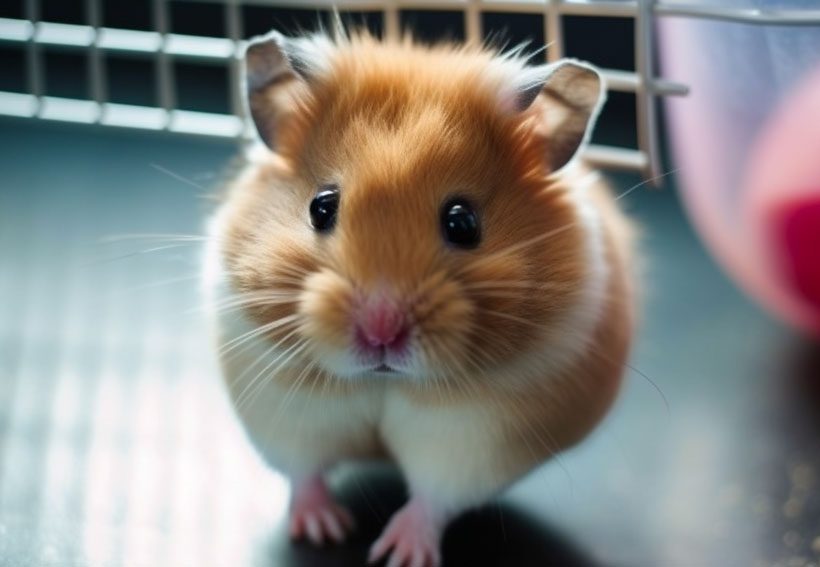
Sugary Drinks
Sugary drinks such as soda, high-sugar juice, and energy drinks should also be avoided as they can lead to obesity and diabetes in hamsters. The sugar content in these drinks can also cause dental problems for your pet.
Hamsters should not drink sugary drinks because they contain too much sugar and acid, which can harm a hamster’s stomach.
Sugary drinks are also high in calories, which can cause obesity in hamsters if consumed in excess. Additionally, sugary drinks lack essential nutrients for a hamster’s health.
Caffeinated Beverages
Caffeinated beverages such as coffee, tea, and energy drinks should not be given to hamsters as they contain high levels of caffeine, which can be toxic. Caffeine can cause dehydration, restlessness, and even death in some cases.
Hamsters should also not drink caffeinated beverages because they have fast metabolisms and rapid heart rates, which can be adversely affected by caffeine.
Caffeine is also toxic to hamsters as it contains theobromine and caffeine, which can increase their heart rate and cause other health issues. Avoid giving your hamster any caffeinated beverages or anything containing caffeine is essential.
Why Is Hydration Important?
Water is essential to the health of all living creatures, and hamsters are no exception. It helps regulate the body temperature, transport nutrients, and eliminate waste.
When a hamster is dehydrated, their organs can become damaged, leading to severe health problems or even death. That’s why ensuring that your hamster drinks enough water daily is essential.
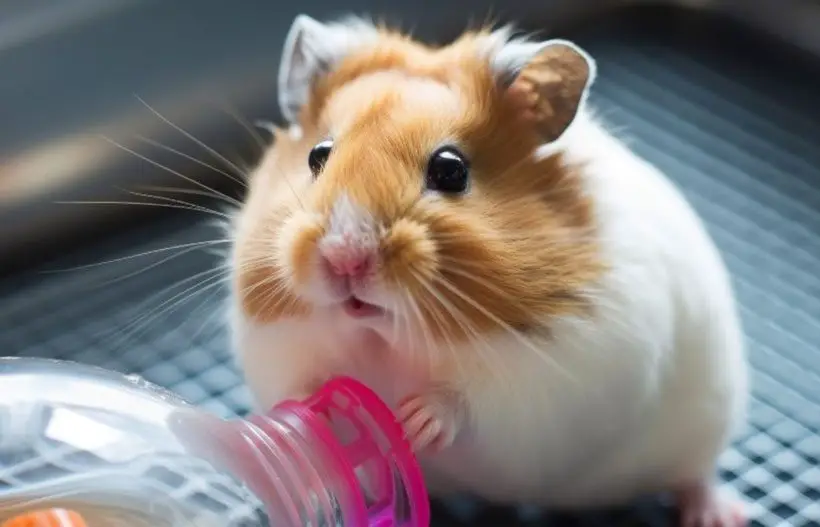
Common Symptoms Of Dehydration
You should be aware of several signs of dehydration in hamsters. These include:
- Decreased urination: If your hamster is not urinating as frequently as usual, it could be a sign of dehydration.
- Lethargy and disinterest: If your hamster seems uninterested in its surroundings or is not as active as usual, it could be a sign of dehydration.
- Excessive salivation: Dehydrated hamsters may produce more saliva than usual.
- Slower skin elasticity: Pinch the skin on the back of a hamster’s neck. It could be a sign of dehydration if it takes longer than usual to return to its normal position.
If you notice these symptoms, you must immediately take your hamster to the vet for medical attention and electrolyte supplements if necessary.
How To Prevent Dehydration
To prevent dehydration in your pet hamster, you must ensure they drink enough water daily. Here are some tips to help you do that:
- Ensure that the water bottle or bowl is always full: This is the easiest way to ensure that your hamster gets enough water. Check regularly to make sure that the water is clean and fresh.
- Offer fruits and vegetables with high water content: If your hamster needs to drink more water, try offering fruits and vegetables with high water content. Some examples include cucumbers, celery, lettuce, Chinese cabbage, and carrots. These foods will provide additional hydration and essential vitamins and minerals.
- Avoid exposure to heat: Heat can be deadly to hamsters, as they quickly become dehydrated when exposed to hot temperatures. Therefore, their cage must be in a cool place with ample ventilation; anything near radiators or windows should be avoided.
How To Rehydrate A Dehydrated Hamster
If your pet hamster has become dehydrated due to a lack of proper hydration, there are several things that you can do to help them recover:
- Offer small amounts of plain water: Use a syringe or feeding tube to offer your hamster small quantities of plain water until they start drinking more.
- Use electrolyte solutions: Adding a few drops of Pedialyte (an electrolyte solution) into their water can help quickly replenish lost fluids and electrolytes.
- Provide fresh fruits and vegetables: Provide fresh fruits and vegetables with high water content, such as cucumber slices or celery.
How To Handle Hamsters When Providing Them Water
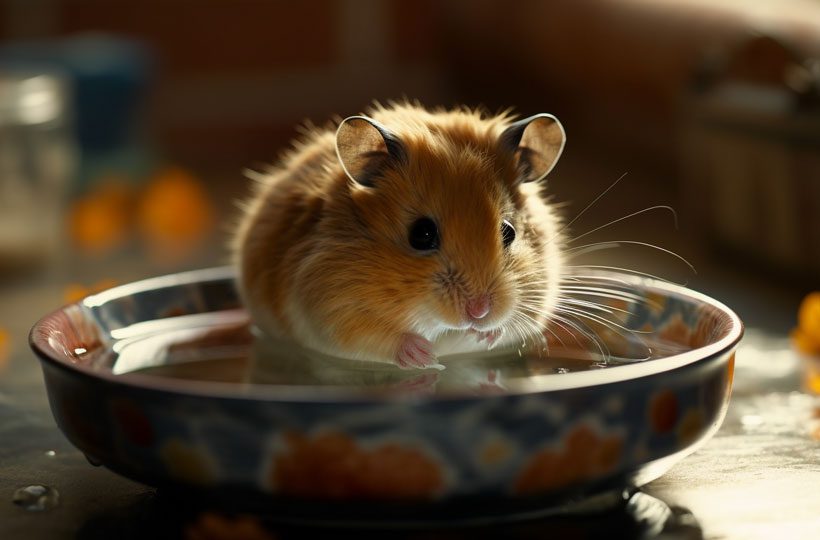
When handling your pet hamster, you must be exceedingly careful. Too much pressure can lead to devastating health issues like broken bones or organ damage.
- Support their body from underneath with both hands to pick them up safely and securely.
- Avoid squeezing tightly when lifting them out of the cage or habitat. Using two hands is always a great idea when transferring small animals.
- It’s also important not to provide water with food near each other as this could lead to digestive issues over time due to contamination. Instead, ensure separate areas are allocated specifically for eating or watering so there will always be clarity between these two activities.
- Lastly, try to fill the drinking bowl only part of the way up. Too much-standing water could attract pests and cause further problems down the line.
What Is The Best Drinking Container For Your Hamster
When providing drinks for your pet hamster, it’s vital always to choose an appropriate container for them to access clean water when needed.
Ceramic dishes and glass containers are not the best options for hamsters as they are prone to bacteria buildup. These containers are also fragile and may break if your hamster knocks them over.
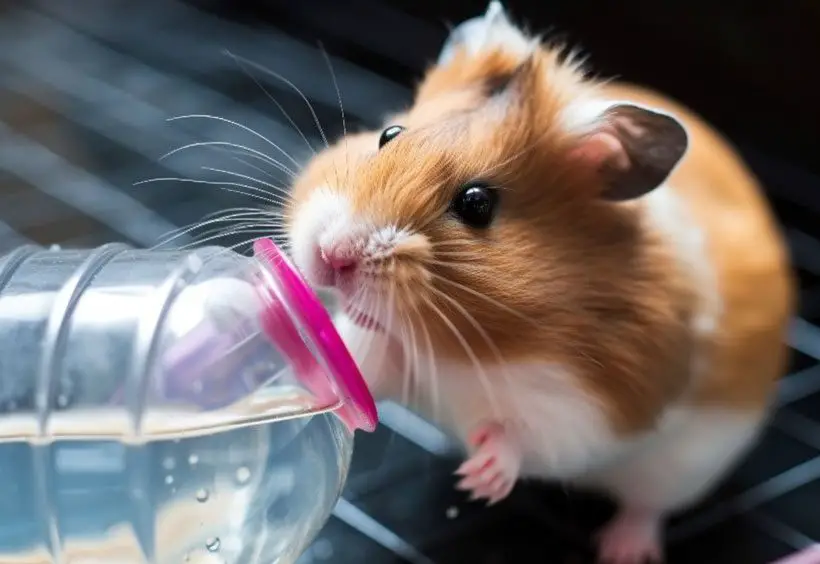
Here are the few options you can use:
Strong, Steady Containers
Investing in heavy plastic cups or stainless steel bowls with lids can secure your pet’s hydration and make clean-up easier. To guarantee that your hamster never has difficulty getting a drink, remember to place the bowl at ground level so they can access it quickly and safely.
Automatic Watering System
Another option for providing water to your hamster is installing an automatic watering system. A gravity-feeder system is a convenient option for fresh water bottles and nipples or siphon tubes fitted into barbed nipples attached directly to cages.
This system ensures that your hamster always has access to fresh water without the need for you to refill it constantly.
What Foods Provide Hydration To Hamsters
Keeping your furry friend well-hydrated is essential to their health, and the water they drink plays a key role. However, some other dietary options can help with this as well.
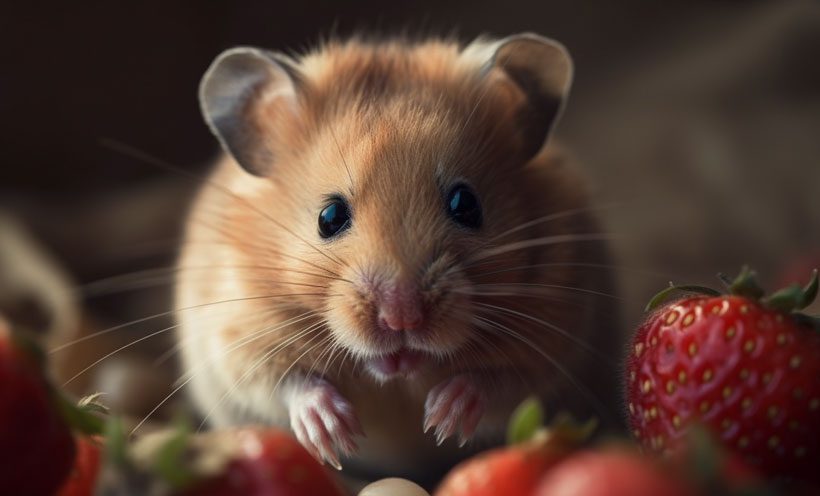
Some good foods to eat when they are thirsty are
- Celery
- Cucumber
- Carrots
- Lettuce
- Spinach.
They can also eat fruits like
- Apples
- Pears
- Grapes
- Strawberries
Likewise,
- Hay
- Nuts
- Seeds
- Raisins
- Dried mealworms
- Yogurt drops
- Sunflower hearts are also good choices.
Incorporating a variety of food into their daily meals can help keep small animals like hamsters hydrated, even without regular access to fresh water.
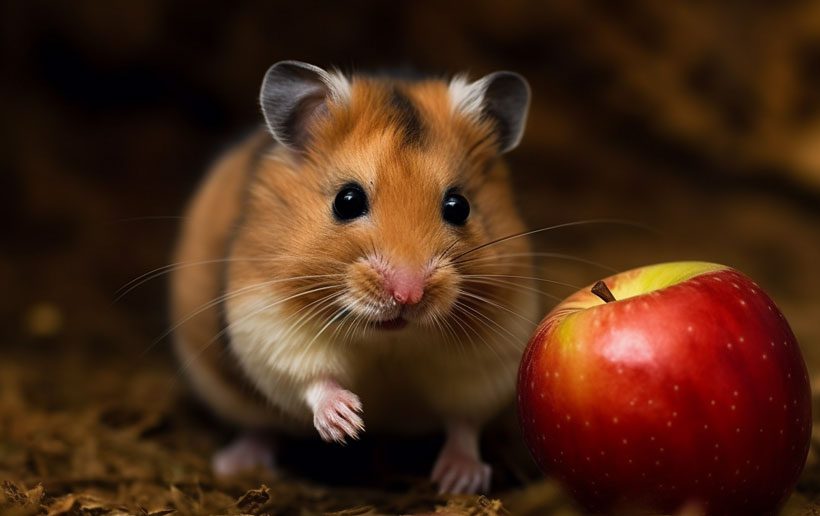
These foods contain high moisture levels, which are easy for them to consume due to their size. As long as your furry companion has enough clean drinking water and wet food, they will remain healthy and content.
Dairy products like milk and cheese should be avoided when feeding your hamster. Hamsters are lactose intolerant, making them prone to digestive issues such as bloating, diarrhea, and abdominal pain after consuming dairy.
Furthermore, the high calcium levels in these items can cause kidney problems or even bladder stones for your pet.
Understanding what your hamster can and cannot drink is crucial to ensuring their health, but there are other important topics to consider as well. For example, it’s important to be aware of your hamster’s lifespan so you can provide appropriate care. Our guide on hamster lifespan provides valuable information on the average lifespan of different hamster species and how to help your pet live a long and healthy life. Additionally, overfeeding your hamster can be dangerous and even deadly. Our guide on can hamsters eat themselves to death offers important information on how to prevent overfeeding and ensure your pet stays healthy. By reading through these guides, you’ll be well-equipped to care for your hamster and keep them happy and healthy.FAQs
Below are some of the most common questions people ask about what hamsters can drink and can’t drink:
Q: How Often Should I Give My Hamster Treats?
Hamsters should be given treats no more than once a week, as too many treats can lead to obesity and other health issues. The treats should be small fruits and vegetables, nuts, or seeds.
Q: How Do I Know If My Hamster Is Sick?
Common signs of a sick hamster include lack of appetite, lethargy, diarrhea, decreased grooming, unusual breathing, or unresponsiveness. If you notice these signs, contact your veterinarian immediately, as more serious illnesses can be life-threatening.
Q: Should I Let My Hamster Out Of Its Cage?
It’s generally not recommended that your hamster roam free in open areas because they can quickly get lost or injured in unfamiliar surroundings or by predators. However, supervised playtime outside the cage is safe and beneficial for your pet’s mental and physical health.
Conclusion
Hamsters love to drink water and should have access to it at all times. They can also enjoy small amounts of skim or oat milk and other fluids such as low-sugar juice in moderation. It’s essential to avoid any sugary drinks or caffeinated beverages, as these can be toxic and lead to dehydration and other health problems.
Additionally, alcohol should never be given to hamsters as it can be deadly. Proper hydration is essential for your pet’s health, so always make sure that your hamster has fresh and clean water available.





